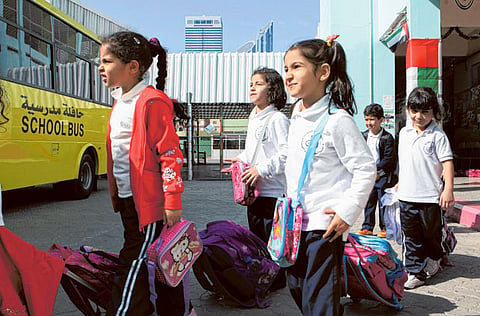Additional 70,000 school seats required by 2020 in Abu Dhabi
Private education roster in Abu Dhabi expected to grow by 7% until 2020

Abu Dhabi: Within seven years, the emirate of Abu Dhabi must create an additional 70,000 seats in private schools in order to provide for residents’ educational needs, senior officials announced in the capital on Tuesday.
By 2020, private schools are expected to accommodate about 283,000 pupils.
The private school student enrolment roster is expected to grow by as much as seven per cent each year, said Hamad Al Daheri, executive director for private schools and quality assurance at the Abu Dhabi Education Council (Adec).
“In the 2013-2014 academic year, these schools enrolled more than 215,000 pupils, with 74 per cent of them in schools with annual fees lower than Dh20,000,” he said.
Al Daheri called upon new investors and existing school operators to develop institutions that offer quality education at affordable rates.
Al Daheri was speaking at the second forum for investment in private education in the presence of 350 investors, developers and government officials.
“We realise the importance of the private sector in delivering education, and our vision is to make Abu Dhabi one of the best investment opportunities for the field of education,” said Dr Amal Al Qubaisi, director-general at the Adec.
“Efforts should be made to provide an appropriate environment and offer support to attract high-quality operators and to encourage the expansion of existing schools,” she added.
According to current statistics released by the Adec, about 62 per cent of pupils in Abu Dhabi attend 185 private schools. This number is also growing by five to seven per cent each year.
Yet seat shortages are faced by parents each year.
School operators and financial experts at the forum pointed out that investment in education requires long-term commitment, and this deters many investors if adequate support is not provided by regulators.
To that end, Adec officials announced the allocation of three new plots for schools. Two of the plots are located in Khalifa City, and may house a 1,558-pupil British curriculum school and a 3,275-pupil American curriculum school. The other piece of land in Al Falah may be used to open a Ministry of Education-curriculum school for 3,168 pupils.
“The schools will create nearly 8,000 more seats, and are expected to become operational by the 2016-2017 academic year,” announced Tareq Al Ameri, manager of promotion and business development for private schools at the Adec.
“Investors must only pay a nominal rent each year to avail of these lands, and we offer this to encourage potential operators,” Al Ameri told Gulf News.
Officials added that 11 new schools, offering about 14,500 seats are expected to become available at the beginning of the 2014-2015 academic year in September.
The Adec is also implementing a comprehensive plan to license and open 97 new facilities.
In the past, the authority has allocated 49 plots to potential investors, as well as three vacant government buildings.



